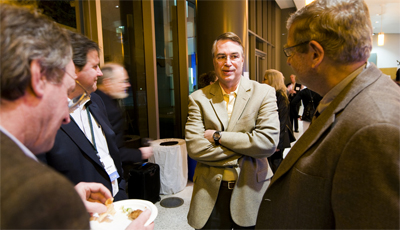Greening the Internet in a Carbon-Constrained World
February 2, 2009 / By Larry Smarr, Director, Calit2
San Diego, Feb. 2, 2009 -- Calit2 and the California Public Utilities Commission (CPUC) recently hosted a "Greening the Internet Economy" workshop, co-chaired by CPUC Commissioner Rachelle Chong and Calit2 Director Larry Smarr. Smarr was subsequently invited to contribute a Forum article on energy efficiency, the Internet and climate change, to Xconomy.com, the fast-growing technology and business news service that recently launched its San Diego edition (after Boston and Seattle). An excerpt from the Calit2 director's article is reprinted below; for the full text, read it on the Xconomy.com website.
This year marks a turning point in the debate on global climate change. The focus of the discussion is rapidly moving from a scientific analysis of how human activity affects climate change to a political process on how best to regulate greenhouse gas (GHG) emissions. California is leading this shift with its 2006 Assembly Bill 32 (AB32) calling for the state’s GHG emissions by 2020 to be no more than 1990’s, roughly 15 percent lower than 2008’s.
|
The Climate Group’s Smart 2020 study reveals that the global Information and Communication Technology (ICT) industry produces greenhouse gases equivalent to that produced by the aviation industry (~2-3 percent). Furthermore, the ICT sector’s emissions will nearly triple, in a business-as-usual scenario, from 2002 to 2020. On the other hand, the Climate Group estimates that transformative applications of ICT to electricity grids, logistic chains, intelligent transportation and building infrastructure, and other social systems can reduce global greenhouse gas emissions by about 15 percent— five times ICT’s own footprint!
This opportunity led the California Institute for Telecommunications and Information Technology (Calit2) to co-host with the California Public Utilities Commission a workshop on greening the Internet economy. The two-day event, held at UC San Diego a week ago, brought together 200 leaders from industry, academia, and the public sector to discuss how to reduce ICT’s carbon footprint, while using ICT innovations to build out the smart grids, buildings, and transportation systems necessary to achieve the goals set by AB32. Webcasts of all the talks are available here.
The quality of the workshop discussions, starting with the keynote from Bill Wiehl, Google’s Green Energy Czar, was exceptional. IBM, Intel, HP, Sun, SilverSprings Network, CISCO, GM, and others from the private sector provided a great deal of insight into the “real world” challenges of applying ICT innovations to reduce greenhouse gas emissions.
What was most interesting to me was the near universal recognition that we need to re-invent into a digital architecture our telecommunications, transportation, building, energy, and entertainment systems if we are going to meet targets like AB32. That is, we must integrate the Internet with each of these pre-existing societal-scale systems, so that myriad connected sensors and actuators throughout the systems enable them to become self-regulating so that they use much less energy. Lights and thermostats will adjust if no humans are sensed in rooms of buildings, cars will spend less time in congestions (burning fuel but going nowhere), and consumers will adjust their use of electricity in response to real time knowledge of pricing.
A recurring theme from the workshop is that we need more public/private “AB32 testbeds” that enable scientists to experiment with the complex tradeoffs required...
[To read the full article, go to http://www.xconomy.com/san-diego/2009/02/02/greening-the-internet-in-a-carbon-constrained-world/ .]
Related Links
Xconomy Article on "Greening the Internet Economy" Symposium
Greening the Internet Economy


